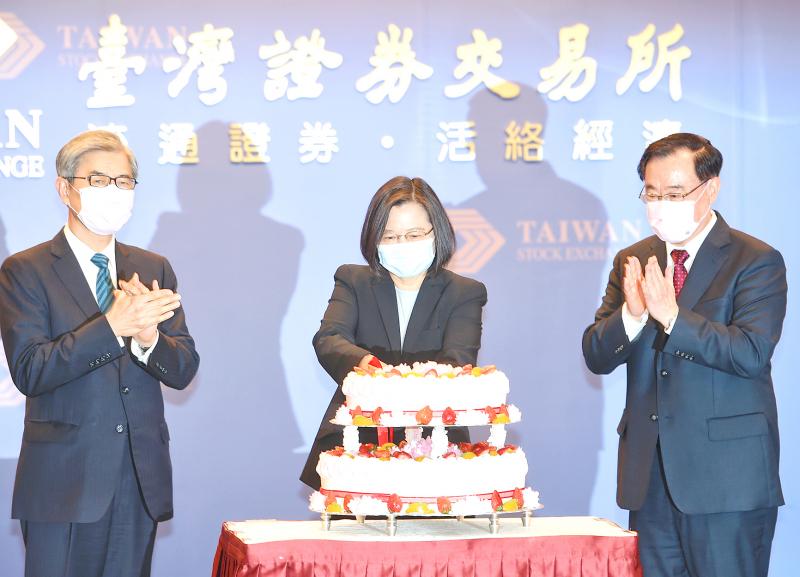Thanks to a more diversified structure, the local stock market is healthier today than in 1990, when it crashed after the weighted index hit a peak of 12,682 points, Taiwan Stock Exchange (TWSE) chairman Hsu Jan-yau (許璋瑤) said yesterday.
Hsu’s comment came amid rising concern about whether a stock market bubble is forming, as the TAIEX has kept hitting new records for the past few months.
“It is no surprise that investors are concerned and we are glad to see that they are being cautious about investing. However, the current composition of TWSE-listed companies is different from that 30 years ago,” Hsu said at a ceremony to celebrate the exchange’s 60th anniversary.

Photo: Fang Pin-chao, Taipei Times
The majority of TWSE-listed companies in 1990 were in the traditional (60 percent) and financial industries (37 percent), while technology companies only made up 2 percent of the total, he said.
It was difficult for such a structure to sustain high growth, he added.
The main board’s structure has become more diversified, with the electronics sector accounting for 67 percent of TWSE-listed companies, the traditional sector 18 percent and the financial sector 10 percent, Hsu said.
As Taiwanese electronics companies are competitive, they have supported the TAIEX’s rise, he said.
However, an overconcentration in any industry is a risk, so the TWSE is working on helping local or foreign start-ups raise capital by setting up a new trading board, the Taiwan Innovation Board (TIB), which was approved by the Financial Supervisory Commission last year.
That conforms to President Tsai Ing-wen’s (蔡英文) policy of promoting industrial diversification, he said.
Tsai yesterday visited the TWSE to thank employees for their work and maintaining the exchange’s smooth operation, despite the COVID-19 pandemic.
She said she hoped a new bull market has begun before the start of the Year of the Ox.
The government would ensure that Taiwan continues to hold a key position in the global supply chain network as a center of high-end manufacturing, high-tech research and development, advanced manufacturing for semiconductors and green energy, Tsai said.

Among the rows of vibrators, rubber torsos and leather harnesses at a Chinese sex toys exhibition in Shanghai this weekend, the beginnings of an artificial intelligence (AI)-driven shift in the industry quietly pulsed. China manufactures about 70 percent of the world’s sex toys, most of it the “hardware” on display at the fair — whether that be technicolor tentacled dildos or hyper-realistic personalized silicone dolls. Yet smart toys have been rising in popularity for some time. Many major European and US brands already offer tech-enhanced products that can enable long-distance love, monitor well-being and even bring people one step closer to

Malaysia’s leader yesterday announced plans to build a massive semiconductor design park, aiming to boost the Southeast Asian nation’s role in the global chip industry. A prominent player in the semiconductor industry for decades, Malaysia accounts for an estimated 13 percent of global back-end manufacturing, according to German tech giant Bosch. Now it wants to go beyond production and emerge as a chip design powerhouse too, Malaysian Prime Minister Anwar Ibrahim said. “I am pleased to announce the largest IC (integrated circuit) Design Park in Southeast Asia, that will house world-class anchor tenants and collaborate with global companies such as Arm [Holdings PLC],”

Sales in the retail, and food and beverage sectors last month continued to rise, increasing 0.7 percent and 13.6 percent respectively from a year earlier, setting record highs for the month of March, the Ministry of Economic Affairs said yesterday. Sales in the wholesale sector also grew last month by 4.6 annually, mainly due to the business opportunities for emerging applications related to artificial intelligence (AI) and high-performance computing technologies, the ministry said in a report. The ministry forecast that retail, and food and beverage sales this month would retain their growth momentum as the former would benefit from Tomb Sweeping Day

Thousands of parents in Singapore are furious after a Cordlife Group Ltd (康盛人生集團), a major operator of cord blood banks in Asia, irreparably damaged their children’s samples through improper handling, with some now pursuing legal action. The ongoing case, one of the worst to hit the largely untested industry, has renewed concerns over companies marketing themselves to anxious parents with mostly unproven assurances. This has implications across the region, given Cordlife’s operations in Hong Kong, Macau, Indonesia, the Philippines and India. The parents paid for years to have their infants’ cord blood stored, with the understanding that the stem cells they contained